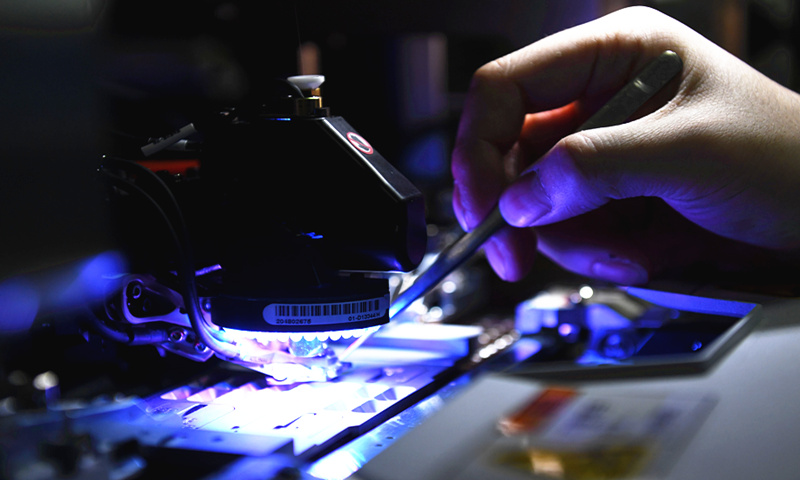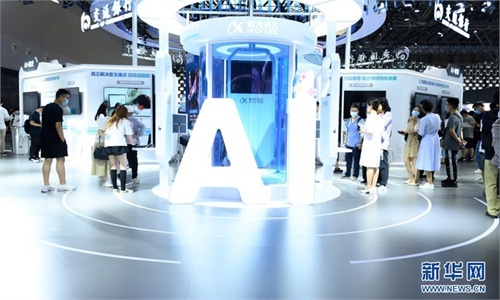Chinese FM calls US push for ban on ASML sales a typical case of ‘technological terrorism’

Workers make chips at Anhui Dongke Semiconductor Co in East China's Anhui Province on Saturday. The company is located in the Anhui Ma'anshan Economic and Technological Development Zone, and it is mainly engaged in the design, production and sales of green power chips. Photo: VCG
A spokesperson for China's Foreign Ministry on Wednesday harshly criticized the US' move to push the Netherlands to ban chipmaker ASML from selling equipment to China, calling Washington's attempt another example of "coercion diplomacy" and a typical case of "technological terrorism."
The US continues to link technological and trade issues with politics and ideology and uses them as tools to push forward its technological blockade and decoupling in attempt to block others' path, but it will only isolate itself in the end, Chinese Foreign Ministry spokesperson Zhao Lijian said on Wednesday.
"By realizing that it's unfeasible to simply rely on the US, other countries will accelerate science and technological independence," Zhao said, noting that the US will eventually find itself at a dead end.
The US is lobbying the Netherlands to restrict ASML Holding NV from selling some of its slightly older deep ultraviolet lithography (DUV) systems, as the US attempts to contain China's development in the chip sector, Bloomberg reported on Wednesday, citing people familiar with the matter.
The US' move would add "monumental" pressure on ASML if it is banned from selling China its DUVs, a major piece of equipment that is currently widely used in China's chip sector, Xiang Ligang, director-general of the Beijing-based Information Consumption Alliance, told the Global Times on Wednesday.
ASML dominates the global market for lithography equipment used in the semiconductor industry, with a revenue market share of above 80 percent, according to a Moody's report published on the company's official website. China is ASML's third-largest export market, representing around 16 percent of the company's sales in 2021, according to Reuters.
However, the company has been unable to sell its most advanced equipment to China since 2019, as it could not get a license from the Dutch government following diplomatic pressure from the US.
ASML's US shares fell 3.87 percent to $432.4 on Tuesday.
The company declined to give further comment when reached by the Global Times on Wednesday.
"The restriction may limit production capacity expansion among some Chinese semiconductor manufacturers in the short term, but it will in turn boost progress of domestic research and development (R&D) for self-reliance of relevant technologies," Xiang said.
Shrugging off concerns over the US' intensifying technological containment, Chinese chip shares surged on Wednesday. Guotai Semiconductor Industry ETF trading in Shanghai closed up 1.6 percent to 1.141 yuan on Wednesday. Shanghai-based Primarius Technologies Co, a global leading supplier of electronic design automation (EDA) products and solutions, rose by the daily cap of 20 percent to 34.27 yuan ($5.11) per share.
Advanced Micro-Fabrication Equipment Inc, a Chinese manufacturer of semiconductor equipment, climbed 13.79 percent to 126.42 yuan per share at the close.
Li Haidong, a professor at the Institute of International Relations of China Foreign Affairs University, told the Global Times the US' behavior of weaponizing its technological hegemony and pressuring other countries and companies to contain China's development harms their independence and is beneath a major power.
Zhao on Wednesday also called for the US to make the right decisions by taking an objective and fair stand, while taking into consideration its own long-term interests and fair and equal market principles. "We believe the relevant parties are able to maintain independence and make independent decisions," he said.


